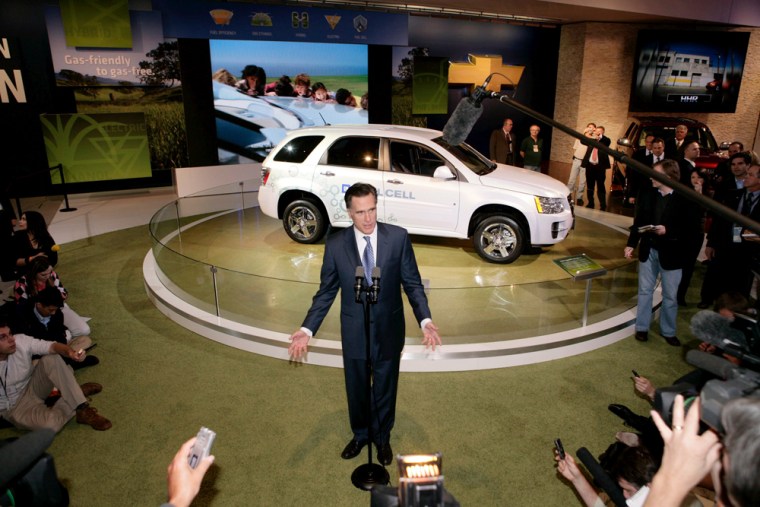For Democratic presidential contenders, the growing risk of a recession is an opportunity for action. For Republican contenders, accustomed to calling for less government intervention, it presents a dilemma.
In the last several days, the leading Democratic rivals have rushed out proposals to spur the economy with one-time tax rebates, expanded unemployment benefits, money to prevent home foreclosures and assistance for state and local governments.
Senator Hillary Rodham Clinton of New York has proposed $70 billion in emergency spending programs, with an additional $40 billion in tax rebates if the economy worsens. Senator Barack Obama of Illinois has a $75 billion plan based largely on immediate tax rebates of $250 to most workers to encourage consumer spending.
John Edwards put out a plan last month proposing more money for unemployment benefits, energy projects and a “home rescue fund” for people in danger of losing their houses.
GOP sticks with small-government message
By contrast, the leading Republican candidates are much more skeptical about short-term government rescues.
Even as they campaign in Michigan, where the automobile industry is depressed and unemployment is high, most Republican candidates are sticking to their existing proposals for lower taxes and less regulation.
The Republican presidential candidates have been more skeptical about short-term stimulus measures than President Bush has been. Mr. Bush signaled last week that he would propose a package of measures, probably dominated by tax cuts, in his State of the Union address on Jan. 28.
The debate among candidates about stimulus measures is largely academic, because economic conditions are almost sure to be entirely different by the time a new president takes office a little more than a year from now.
Different approaches
But the debate shows big differences, even between candidates in the same party, in how the rivals would approach economic problems.
Among the Republicans, Senator John McCain has a proposal to abolish the alternative minimum tax, a move that would save taxpayers $1 trillion over the next decade but would have little impact in the next year.
Mitt Romney, the former governor of Massachusetts, campaigning in Michigan, promised on Monday to push for a fivefold increase in spending on energy and automotive technologies.
But Mr. Romney has said little about any emergency measures to fend off a broader recession this year. Instead, he promised long-term measures to overhaul the tax code and said he would fight new regulations, including tougher fuel-economy requirements for cars and trucks that Congress recently passed and Mr. Bush signed into law.
Giuliani rebukes 'nanny government approach'
Rudolph W. Giuliani, the former mayor of New York City, has not released a plan to deal specifically with the current slowdown. But Mr. Giuliani pointedly ridiculed the more activist approaches of Mrs. Clinton and other Democratic contenders.
“It’s a typical central government approach, a nanny government approach,” Mr. Giuliani told supporters at a rally on Monday in Naples, Fla.
Mr. Giuliani, like most of his Republican rivals, would make all of Mr. Bush’s tax cuts permanent. He would also reduce the corporate tax rate, to 25 percent from 35 percent, and reduce the tax rate on capital gains.
Mr. Giuliani’s advisers acknowledged on Monday that those ideas were not tailored to the current evidence of a looming economic downturn. Making Mr. Bush’s tax cuts permanent would have no immediate effect on the economy, because the tax cuts are set to remain in force until the end of 2010.
Reducing corporate and capital gains taxes would do little immediately to benefit people who have lost their jobs, and many economists argue that tax cuts will have the most short-term stimulative impact if they are aimed at people most in need.
But David R. Malpass, an economic adviser to Mr. Giuliani, said the goal was to create the best conditions for investment.
“The mayor’s view is that the best economic recovery package is something that’s lasting,” Mr. Malpass said. “It’s not giving cash back to people, but creating a better environment for growth.”
Douglas Holtz-Eakin, Mr. McCain’s top economic adviser, expressed a similar skepticism about government efforts to fine tune the economy. “The track record of the government trying to time these things is not good,” Mr. Holtz-Eakin said.
Dems press for wholesale reform
The Democratic contenders are far more eager than Republicans to propose economic-rescue measures. Democrats are also willing to waive temporarily their insistence on fiscal discipline, a cornerstone of Mrs. Clinton’s long-term approach.
Appearing Sunday on “Meet the Press” on NBC, Mrs. Clinton bluntly declared that a stimulus package should be allowed to increase the federal deficit temporarily because it is intended to inject additional money into the economy.
There are differences between some of the Democratic plans. Mrs. Clinton and Mr. Obama have proposed plans that could ultimately cost $110 billion. The Clinton plan relies heavily on government spending, and the Obama plan would rely more heavily on temporary tax breaks.
Mr. Obama would provide an immediate tax rebate of $250 to workers and would pay an extra $250 to every person collecting Social Security benefits. If unemployment increases three months in a row, he would pay an extra $250 to workers and retirees.
Mr. Obama’s plan would also provide $10 billion to help homeowners avoid foreclosure, $10 billion to states that are hardest hit by the downturn and $10 billion to extend unemployment benefits to more people, including temporary workers and self-employed long-time unemployed workers.
Austin Goolsbee, Mr. Obama’s top economic adviser, said the payments represented the fastest way of getting money to people who are most likely to need it and to spend it quickly.
Mr. Edwards and Mrs. Clinton have proposed plans to channel more money to government programs. Mr. Edwards would put money into building “clean energy” public works. Mrs. Clinton would put $30 billion into an “emergency housing crisis fund” and $25 billion into helping low-income people pay heating bills.
Jeff Zeleny contributed reporting from Reno, Nev., and Michael Cooper from Florida.
